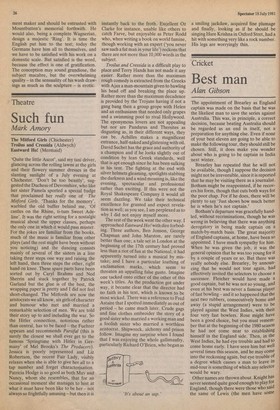Theatre
Such fun
Mark Amory
The Mifford Girls (Chichester) Troilus and Cressida (Aldwych) Eastward Ho! (Mermaid) 'Quite the little Ascot', said my taxi driver, glancing across the rolling lawns at the girls and their flowery summer dresses in the slanting sunlight of a July evening at Chichester. 'Don't be too beastly', suggested the Duchess of Devonshire, who like her sister Pamela sported a special badge that proclaimed her really one of The Milford Girls. 'Thanks for the memory', warbled the old buffer behind me, 'Of castles on the Rhine, ti-turn Sweet Adeline'. It was the right setting for a nostalgic musical about the upper classes, perhaps the only one in which it would pass muster. For the jokes are familiar from the books, much of the music is familiar from other plays (and the rest might have been without you noticing) and the dancing consists mainly of several of the sisters in a line taking three steps one way and raising the left hand, then three steps the other, right hand on knee. These spare parts have been sorted out by Caryl Brahms and Ned Sherrin and stuck together by Patrick Garland but the glue is of the best, the wrapping paper is pretty and I did not feel short-changed. The Mitfords are now the aristocrats we all know, six girls of character and humour who met and married a remarkable selection of men. We are told their story up to and including the war. So the Hitler connection, notorious rather than central, has to be faced — the Fuehrer appears and recommends Parsifal (this is surely the closest we shall ever get to the famous 'Springtime with Hitler in Germany' of Mel Brooks's The Producers). Jessica is poorly represented and Liz Robertson, the recent Fair Lady, visibly relaxes when she is able to give her all to a tap number and forget characterisation. Patricia Hodge is so good as both Muv and Nancy, whom she resembles, that for an occasional moment she manages to hint at what it must have been like to be her — not always so frightfully amusing — but then it is instantly back to the froth. Excellent Oz Clarke for instance, unable like others to catch Farve, but enjoyable as Peter Rodd who, when writing a book on world famine, though working with an expert ('you never saw such a fat man in your life') reckons that there are not more than 10,000 words in the subject.
Troilus and Cressida is a difficult play to place and Terry Hands has not made it any easier. Rather more than the maximum rough comedy is extracted from the Greeks with Ajax a man-mountain given to bawling his head off and breaking the place up. Rather more than the maximum decadence is provided by the Trojans having if not a gang bang then a group grope with Helen and an enthusiasm that needed only grapes and a swimming pool to rival Hollywood. The eponymous lovers are not appealing but nor are Pandarus and Thersites as disgusting as, in their different ways, they can be. Achilles makes a magnificent entrance, half-naked and glistening with oil. David Suchet has the grace and authority of a champion and if he looks slightly out of condition by lean Greek standards, well that is apt enough since he has been sulking in his tent. The fighting at the end with silver helmets gleaming, spotlights stabbing the darkness and a wind moaning is, like the evening, spectacular and professional rather than exciting. If this were not the Royal Shakespeare Company it would all seem dazzling. We take their technical excellence for granted and expect revelation as well; as you see, I am perplexed as to why I did not enjoy myself more.
The rest of the week went the other way. I approached Eastward Ho! with dire forboding. Three authors, Ben Jonson, George Chapman and John Marston, are rarely better than one; a tale set in London at the beginning of the 17th century had proved less than a riot of fun at the National; it had apparently turned into a musical by mistake; and I have a particular loathing of exclamation marks, which seem to threaten an appalling false gusto. Imagine one tacked onto either of the other of this week's titles. As the production got under way, it became clear that the director had no faith in his text, which is known to be most wicked. There was a reference to Fred Astaire that I spotted immediately as out of period — he came much later. Crude gags and fine clothes embroider the story of a good sister who married a working man and a foolish sister who married a worthless aristocrat. Shipwreck, alchemy and prison follow. Imagine my surprise when I found that I was enjoying the whole gallimaufry, particularly Richard O'Brien, who began as a smiling jackdaw, acquired fine plumage and finally, looking as if he should be singing Hare Krishna in Oxford Stret, had a hit with something very like a rock number. His legs are worryingly thin.


































 Previous page
Previous page